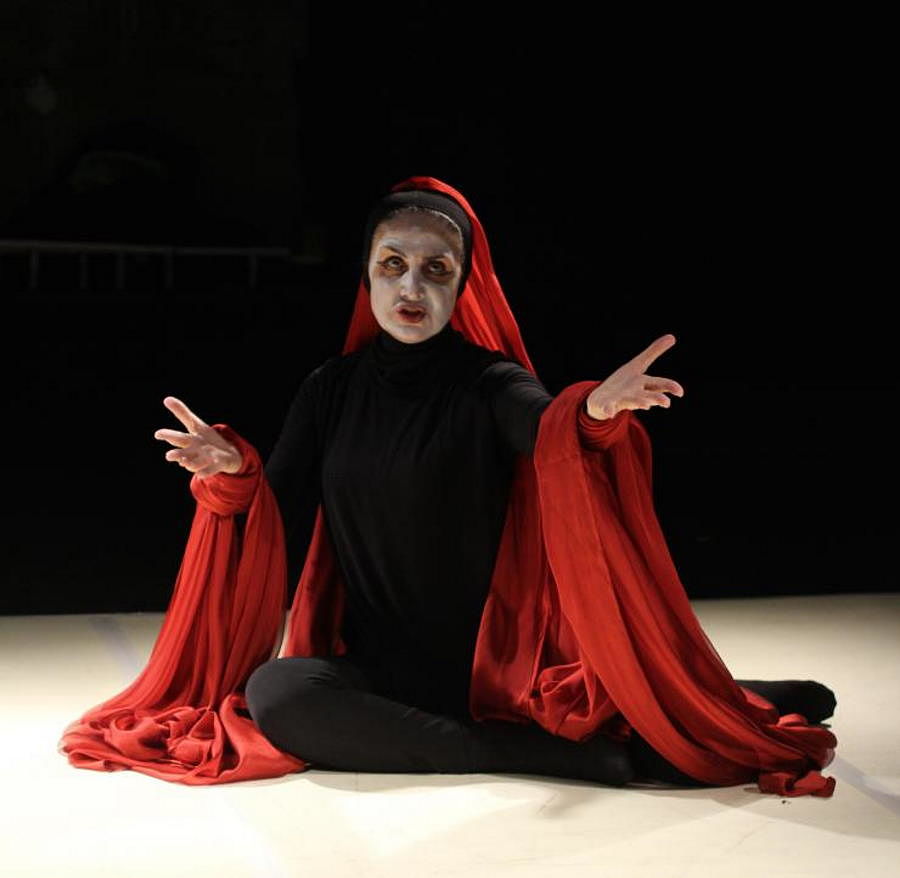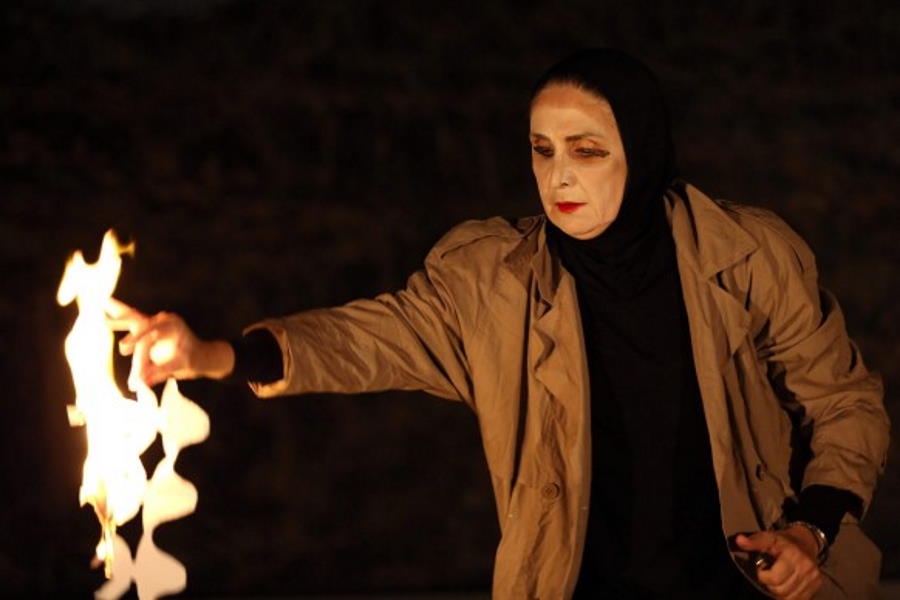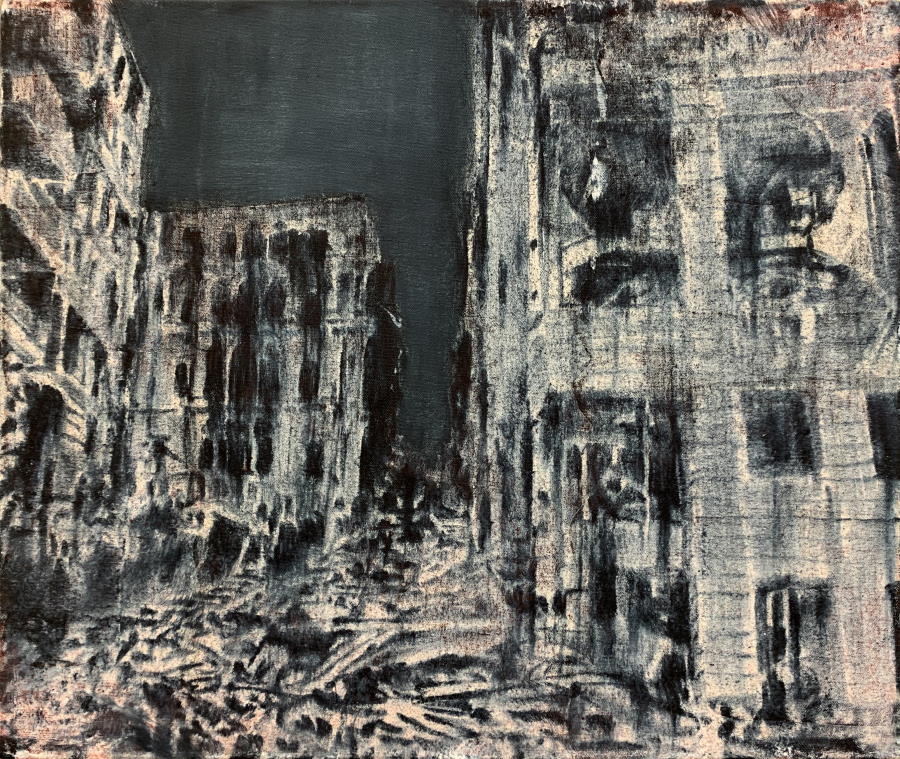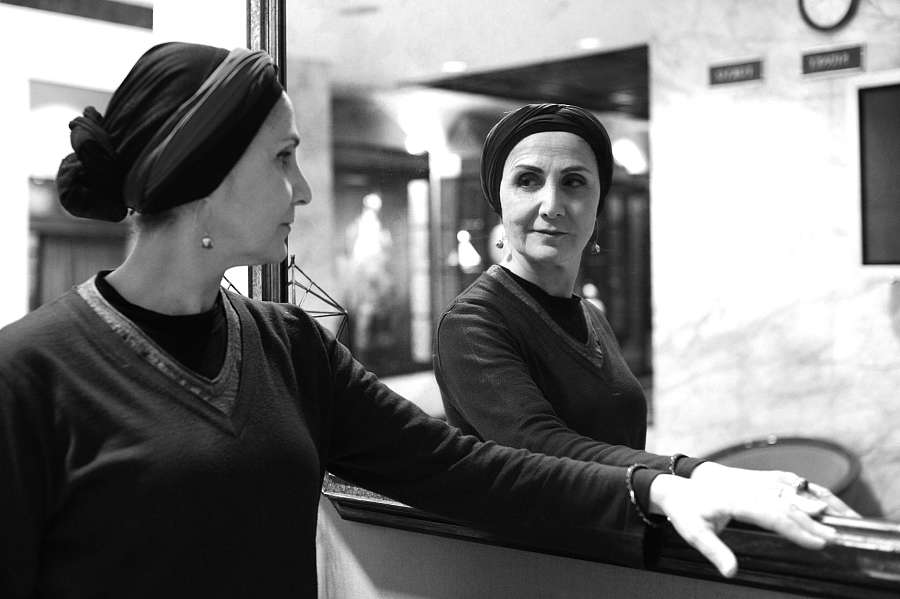Hanane Hajj Ali (she/her) is many women. She is an actor and a playwright. A feminist and a political activist. A mother and a wife. A private and public risk-taker. Beyond Lebanon, where she was born in 1958 and where she lives today, she is perhaps best known for her one-woman play Jogging: Theatre in Progress, a humorous, erotic and finally dark performance, during which Hajj Ali inhabits and tells the stories of four women: Hanane herself; the Medea of Ancient Greek myth and Euripides’s tragedy; and two contemporary Lebanese women, one who kills her children and herself, and another who sacrifices her children to the wars of the Middle East. Or, as Hanane asks in Jogging, “Who is Medea today in a torn city like Beirut? If the age of tragedy as a type of theatre is gone, why do I smell catastrophe every time I run on the streets of Beirut?”
Usually speaking in Arabic, and providing surtitles or a projected translation, she has performed Jogging from Beirut to Edinburgh to Singapore, and in the United States at the Kennedy Center and the Guthrie Theater. In late November 2020, amid the Covid-19 pandemic, she flew to Zűrich, where, after two weeks of quarantine, she performed the play for sogar theater, providing a translation in German.
But Jogging is only one element of a rich career that embraces film as well as theatre, both the teaching of it and the acting and creating of it. Hajj Ali has co-founded non-governmental organizations (NGOs) and cultural associations, notably, in 2003, the Beirut-based Al Mawred Al Thaqafy (Culture Resource), of which she is particularly proud. Supporting artists throughout the Arab region, and encouraging the aesthetic and intellectual value of the region’s cultural heritage, Culture Resource, says Hajj Ali, “was pioneering. This association was the first to create a program in Arabic about cultural standards, offered a wonderful school in an historically rich area, for people who didn’t dare to dream about being artists. Even girls. A lot of taboos were broken.”
Breaking taboos is a feature of Hajj Ali’s life. In response to the October Revolution of 2019—civil uprisings against the corrupt, flailing Lebanese government—she took to the streets of Beirut and raised her voice to protest a callous regime, and the already rich enriching themselves further at Lebanon’s expense. On Aug. 4, 2020, explosions in Beirut’s port, due in large part to the government’s carelessness, turned sections of Beirut to rubble, and Hanane again took to the streets, to help neighbors, friends and theatre colleagues survive and rebuild their city.
In recognition of Hanane Hajj Ali’s artistry and her leadership as a woman in Lebanese theatre, the International Committee of the League of Professional Theatre Women (LPTW) is honoring her with its LPTW Gilder/Coigney International Theatre Award on Tues., Feb. 16, during a virtual ceremony hosted by actor Tamara Tunie. The ceremony is co-presented with the Martin E. Segal Theatre Center and will stream on the HowlRound platform at 1 p.m. ET.
Established in 2011 and presented every three years, the Gilder/Coigney Award celebrates the artistry of theatre women around the world and their contributions to the cultural and political lives of their audiences. In that vein, the Gilder/Coigney Award ceremony will introduce five days of virtual recorded programs, all airing on LPTW’s YouTube channel at 1 p.m. ET (and all sponsored by Showtime).
On Wed., Feb. 17, Hajj Ali and Iranian-born Torange Yeghiazarian, artistic director of Golden Thread Productions in San Francisco, will talk about “How to Keep Creating While Everything Around You Is Falling Apart” (Hanane’s title). Then, on Feb. 18, Hajj Ali joins Maya Zbib, founding member of Beirut’s Zoukak Theatre Company, and Dr. Lina Abiad, assistant professor of communications at Lebanese American University (LAU) – Beirut, for the panel “Women on Stage and in the Streets: Three Leading Beiruti Theatre Artists.” Catherine Coray, a professor at NYU’s Tisch School of the Arts and program director of the Lark’s Middle East/United States Playwright Exchange, will moderate.
“As a performer, Hanane is powerful,” said Coray (she/her) during a telephone interview. “She is unapologetic about her strength, about her passion for Beirut, and her anger at those who would abuse the people of Lebanon. She is also very self-revealing in her work. She is terribly brave.”

Hanane—the name means “tenderness” in Arabic—was born to Shia Muslim parents in a suburb of Beirut. Because her father was in the central government’s security force, the family moved around, and she spent her childhood in southern Lebanon. There, Hanane reminisced lovingly, her mother’s mother taught her to dance and sing and “improvise poems.” Then, when she was about 9 or 10, the family moved back to Beirut, and there, amid a horrific war, Hanane birthed her political consciousness, as well as an instinctual affinity for theatre.
She was 16 in 1975 when civil war overtook Lebanon. It would ravage the country for at least the next 15 years, until its official end in 1990. “Lebanon went up in flames one day,” she said during a luxuriously long WhatsApp conversation from Beirut (I was in upstate New York). The fragile, multi-sectarian Lebanese state had become a ferocious battleground for asserting national identity and political power. Pro-Western Maronite Christians, who headed the government at the time, were confronted by pan-Arabists and Muslims, many of them Palestinian refugees. The Palestine Liberation Organization (PLO) joined the fray, as did Israel and Syria.
Hanane remained in Beirut. “I refused to flee,” she recalled. She remembered standing in the middle of the street and having “a terrible discussion” with her father, who wanted her to get in a car and leave. “‘Listen,’ I told my father, ‘all our life, we in Lebanon have been displaced.’ I told him Beirut is presenting everything I want to fight for. ‘I will not leave even if I’m going to die.’ I felt I got my real freedom at that moment.”
She and her older brother remained in Beirut, often finding safety in garages two stories underground, sheltering with other residents of the city for days at a time. The shelters were “full of stress and tears,” said Hanane, but also, considering the fear and discomfort, remarkably full of human creativity. “Somebody started to sing a song or recite a poem,” she remembered, “and my brother took his guitar, and his friends began to sing, and we joined them, and little by little we began to improvise some scenes, imitate our neighbors, and this stressful, fearful space was transformed by artists and music and chanting into a pleasurable space.”
In the way that a bleak story can have an uplifting ending, a woman whom Hanane met while sheltering said, ‘”You are a very good actress. Why you don’t study theatre?’ I opened wide my eyes and said, ‘Is there a university that teaches theatre? Is it teachable?'”
At the Faculty of Fine Arts and Architecture – Lebanese University, Hanane involved herself in theatre, “but secretly.” Publicly she was studying biology. Indeed, she had initially set out to gain a medical degree, for her father wanted her to be a doctor. But she found dissecting corpses “impossible” and so, to appease her father, switched to biology and began training to be a teacher. When Hanane’s father discovered his daughter had fallen in love with theatre and wanted to be an actress, an occupation that in his world was considered adjacent to prostitution, “he was angry like hell and beat me,” Hanane said. She did eventually receive an undergraduate degree in biology and long ago forgave her father, who has since died. “He felt that I was risking my future,” she says. “I never felt angry, because I knew he was acting like this out of his love…I eventually convinced my father to be my first fan.”
“What really convinced me that theatre was what I wanted to do was when I first saw the al-Hakawati troupe in the South of Lebanon,” said Hanane (Hakawati means “storyteller” in Arabic). “I never had felt in my life such sensation. They use popular songs and write the history of the Lebanese people—the true history. The troupe was trying to collect stories that really happened to people and restructure them into theatre plays,” an approach that Hanane adapted when creating Jogging. “They wanted a new form of theatre. They wanted to decentralize theatre. I felt, this is what I want to do.”
In a country where women are all too often secondary citizens, she was determined to be her own woman, and in 1978 she joined the troupe as an actor and writer. In 1986 she would marry al-Hakawati’s founder, the Lebanese actor, director, and playwright Roger Assaf, with whom she has four children.

Hanane began to conceive Jogging around 2012, during one of her regular morning runs through Beirut. Clad in black yoga pants and a gray cotton top, with a scarf over her brown hair, she equipped herself with headphones and a cell phone, so she could record her thoughts and imaginings while running. She left her apartment, as she says in the play, “at the moment between the disappearance of darkness and the beginning of light,” and she was still jogging after light and heat saturated Beirut. “The whole of Beirut is a kind of absurd mosaic, like villages” is how Hanane described her city to me. “There are a multitude of different people living here. This is why I like Beirut.”
The physical activity of jogging is central to Hanane’s performance, as she often jogs in circles around a bare performance space while speaking to the audience, telling stories and inhabiting the women in her script. (I have read a script published in 2018 in a vibrant English translation by Hassan Abdulrazzak and seen a video of an early performance in Arabic, but I have never had the chance to see a live performance.) “Jogging” is both the play’s central image and a metaphor for surviving in a damaged world, whether that is Beirut, or the Ancient Greece of Medea, or the contemporary Middle East, beset by wars and death.
When Jogging began to emerge from her around 2012, Hanane said, “It wasn’t in my mind that I was writing a play.” But running every morning, she witnessed what she calls the “transformation” of her city—changes that, to her, exhibited a corrupt alliance between the city’s government and the rich. “I used to be in a continuous dialogue in my mind with my Beirut,” was how she described the beginnings of her play. “A building destroyed over one night for gentrification. Our architectural patrimony destroyed for towers of 50 stories, for the sake of money-laundering.” She would come home after her morning jog and “write a little something” by hand, including a humorous fantasy (no longer in the script) in which she imagines bombing the huge hotels that disfigured Beirut’s shore, and reconstructing them with parts from her body and the bodies of others. “I had breasts from a sexy singer,” she recounted jovially.
The first opportunity to go from page to stage came in 2013, when the director Éric Deniaud organized an outdoor festival in Beirut and invited Hajj Ali to participate. Jogging on a treadmill, she performed a 30-minute monologue of her impressions and dreams while running through Beirut. The audience responded enthusiastically, and for the next three years, Hajj Ali, Deniaud, and the dramaturg Abdullah Alkafri collaborated on the play. They “deconstructed” the treadmill, as Hanane puts it, in favor of her jogging around the performance space itself. She wore black tights and leotard and a black hijab, and sometimes draped herself in a voluminous orange cape or coated her face with white makeup, depending on the woman whose story she was telling.
“Hanane wanted to say so much about the Lebanese society,” Deniaud wrote me in an email, “and women in this context. It became obvious that Medea was the red thread of the performance.”
Hanane had dreamed of playing Euripides’s Medea—indeed, was fascinated by the young woman from Colchis, a region on the Black Sea in what is now Georgia. “She was a barbarian,” Hanane tells the audience, “the granddaughter of the sun god Helios, daughter of Aeëtes, she had magical powers…she was the ultimate woman.” At the same time Medea repulsed Hajj Ali: “A mother could not kill her children like that, no matter what Euripides and the gods who made him say.” But when her son Ali was diagnosed with cancer when he was seven, Hajj Ali found herself dreaming, “while jogging, that I was killing my child,” to spare him suffering. “I said, ‘My goodness, I am a part of Medea. A mother could kill out of love.’ ” (Ali survived.)
Subsequently Hanane read in the press about a woman—“Yvonne” in the play—who lovingly dressed her three daughters in new nightclothes, put them to bed and fed them a delicious poisoned dessert, then poisoned herself. That story triggered what became a goal of the play—to explore, as Deniaud put it, “Why would a woman in Lebanon have not a single other choice than to sacrifice her children?”
The “red thread” of Medea culminates in the story of ” Zahra,” who, like Medea, sacrificed her children, in this case to the wars that plague the Middle East. Zahra’s third son dies when the men he fights with kill him because he will not shoot the enemy’s women and children. In a note to his mother he warns her not to believe he died a martyr: “If this is how one attains martyrdom, then I don’t want it.”

Courtesy of Jorge Tacla and Cristin Tierney Gallery
Copyright Jorge Tacla
Deniaud directed the new, fuller version of the script in Beirut in 2016, and since then Hajj Ali has given more than 100 performances in Lebanon: in refugee camps, galleries, artists’ studios—almost anywhere except a formal theatre. According to a legislative decree issued in 1977, any theatrical script must be submitted to Lebanon’s Bureau of Censorship, to be reviewed before it can be staged for the paying public. Jogging‘s sexual, scatological, and subversive language would certainly be forbidden. So Hajj Ali performs Jogging in Lebanon for free, at the risk of fines or even imprisonment, and sometimes sells the script at performances to raise funds. “Either I perform without abiding by that law or I stop doing theatre,” Hanane told me.
In August 2017 Hajj Ali took Jogging to the Edinburgh International Festival, where she received the Vertebra Award for Best Actor. Meanwhile, the director Melissa Nussbaum Freeman, who had seen Jogging in 2016 in Beirut, expanded the play with Hajj Ali’s permission, and in October 2017 staged it with students at the Loeb Drama Center, in Cambridge, Mass. Nussbaum adapted the script for eight actors, some of whom at times form a chorus, and added the character of Margaret Garner, a Black slave who fled Kentucky with her family in 1856, and, when captured, killed her two-year-old daughter to prevent her from ever being enslaved.
Hajj Ali herself once performed an excerpt from Jogging in New York City, back in 2014. Catherine Coray convened “In the Same Room: Middle Eastern Women in Theater” at the NYU Abu Dhabi Institute, a two-day event that brought together theatremakers from the Arab region and American theatre artists with Middle Eastern roots. Jogging was then still in its treadmill incarnation.
Five years later, Hajj Ali performed the play in its entirety for two nights at the Kennedy Center for the Performing Arts, in collaboration with the Sundance Institute Theater Program. Her most recent performances of Jogging in the U.S. took place in late January and early February 2020, at the Guthrie Theater’s Dowling Studio, as part of the Guthrie’s celebration of Arab and Arab-American voices.
Hanane then returned to Beirut, and in the next six months, the city where she grew her activist and creative selves once again proved a place of both human beauty and political ugliness. The resistance that ignited the October Revolution still raged, and Hanane and fellow artists, one with a tambourine, another with a megaphone, went into Beirut’s streets, calling out to people in apartment buildings and offices “about the crisis of corruption”—but calling out, as Hanane described it, “in lyrical and poetic ways.” Beirut’s citizens leaned out their windows, she said, cheering and calling back. “Theatre is this life encounter,” an exuberant Hanane told me.
Our conversation took place last May. On Aug. 4, shortly after six in the evening, ammonium nitrate stored at Beirut’s port exploded in two blasts, creating the equivalent of a 4.5 magnitude earthquake. Buildings were torn apart, at least 200 died, thousands were injured, and as many as 300,000 were made homeless. This, amid a pandemic and a collapsing economy.
Yet for Hanane Hajj Ali, theatre endures despite the chaos. In a draft of her acceptance speech for the Gilder/Coigney Award, she wrote: “Theatre cannot die, because it seeps into the pores of besieged cities in new shapes and forms. Sometimes it remains latent, only to explode again like water that can’t be trapped by stone. It erupts like justice, like freedom.”
Alexis Greene (she/her) is an author and arts journalist. Her biography of Emily Mann will be published in the fall by Applause. www.alexisgreene.com


